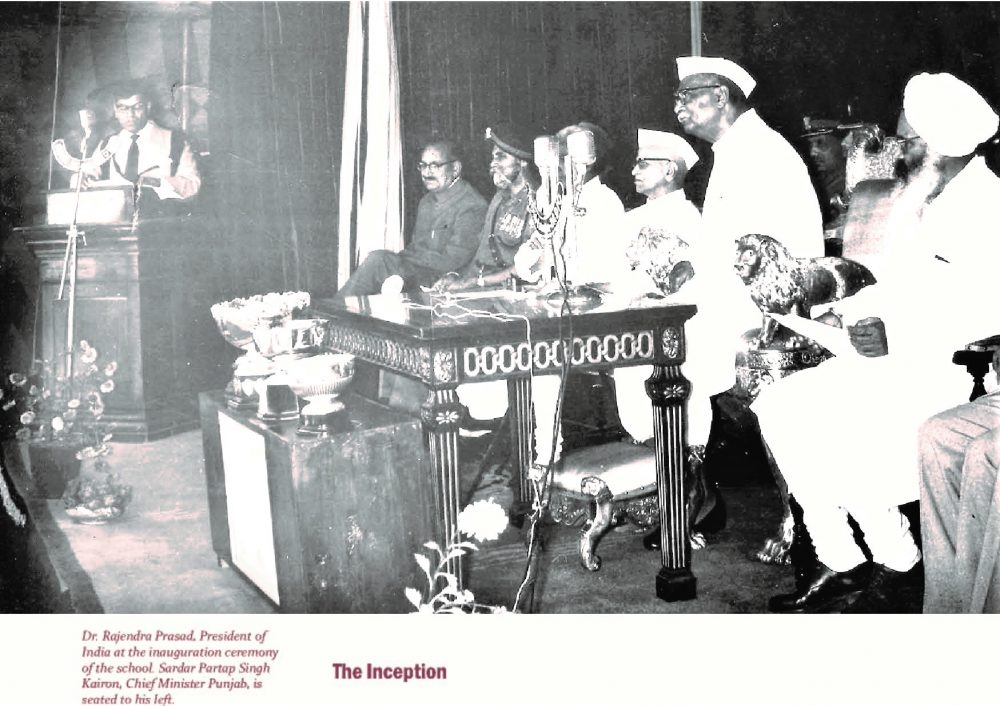
THE HEADMASTER’S REPORT
Mr. President Sir, Chairman and Members of the Board of Governors, Ladies and Gentlemen!
It gives me great pleasure to welcome you here this morning on behalf of the management, staff and boys of The Punjab Public School.
Our joy knew no bounds when Shri N.V. Gadgil, our Chairman, gave us the news that you, Mr. President Sir, had graciously consented to inaugurate the School. We are indeed proud of the great honour you have done us and cannot find words adequately to express our gratitude for this kindness. Very few schools have been as privileged and fortunate as to have the unique honour of being inaugurated by the Head of the Nation. If I mistake not, this is the first public school in independent India to be inaugurated by the First Citizen of the country.
I shall not be exaggerating if I say that we have another and still better reason for justifiable pride on this occasion. The institution could not have found a worthier person, who, apart from his official status, has himself had such a brilliant academic career and has dedicated his life to the cause of the nation. Sir, we, both teachers and students have always found inspiration from your life which is the very model of dedication, scholarship, humility and simplicity. Your presence here on this day will help us to realise the importance of our great and ancient heritage.
We are pleased, too, to welcome once again their Highnesses the Maharaja and Maharani of Nabha. Their presence is of great significance, for both of them have given ample proof of their keen interest in us. We now consider them as part and parcel of the School. The presence of Mr. K. I. Thomas, Headmaster of the Lawrence School, Lovedale and Chairman of the Indian Public Schools Conference, of Major R. Som Dutt, Headmaster of Sanawar, one of the oldest and greatest schools in India, and of Col F.A. von Goldstein, Headmaster of the Yadvindra Public School, who are our next door neighbours, is most encouraging.
I am equally pleased to welcome the parents of the boys, who have tried to be present in such strength. A headmaster of a public school once expressed a desire to work in an orphanage after his retirement, because there would be no parents to advise him how he should handle children. But whatever little experience I have had of the parents of this school has convinced me that they are very co-operative and understanding, and I regard their
visits as a pleasure rather than an interference.
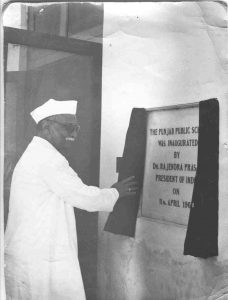
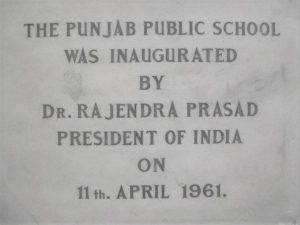
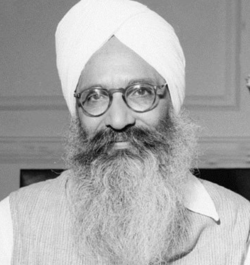
Pictures of the Inauguration by the President, The Plaque and the force behind the School, Sardar Partap Singh Kairon.
It would not be out of place here to trace briefly the history of the institution. Perhaps most of you know that there exists a Committee of Administration of the Punjab Post War Services Reconstruction Fund, of which the Governor of Punjab is the Chairman, and other members include the Chief Minister, General Officer Commanding in Chief, Western Command, in addition to several other official and non-official members. This fund is meant for the welfare of ex-servicemen and, as one of the steps towards achieving this object, Sardar Partap Singh Kairon suggested, at one of the meetings which took place exactly two years ago, the starting of a residential school with a military bias. The proposal was approved by the committee and Lt General Kalwant Singh, who was then General Officer Commanding-in-Chief, Western Command, was requested to draw up a detailed scheme. A sub-committee with Lt General Kalwant Singh as Chairman was appointed to go ahead with the execution of the scheme. The committee went around important public schools of the country, including R.I.M. College, Dehra-Dun, and studied in detail all the aspects and needs of such a school. As a result of the steps taken by the sub-committee, I arrived in Nabha on New Year’s Day of last year. Within three and half months this place started humming with activity as the School began to fill in with boys, and on the 14th of April,1960,the school started functioning, after a simple and informal ceremony at which Lt General Kalwant Singh was present, not in the capacity of chief guest, but as head of the family.
A great deal of credit for the successful establishment of the School goes to Sardar Partap Singh Kairon and his Government. It would not be an exaggeration to say that this school is a living monument to the quick decision, prompt action and enlightened outlook of the Kairon Government. The State Government has given us three palatial buildings, 32 acres of land, and Rs 10,00,000/- in cash with which to equip the school. Not only were we, staff, boys and parents, amazed at the alacrity and generosity with which the Government help was forthcoming, but members of the Inspection Committee of the Indian Public Schools Conference, who inspected our School last October, congratulated the Government of Punjab on its enlightened attitude in their Inspection Report.
The initiative of the Punjab Post War Services Reconstruction Fund and the generous help of the Government of Punjab would not have taken concrete shape in the form of the School, had not General Kalwant Singh been at the helm of affairs. He has worked extremely hard to put this School on its feet, and we shall always be indebted to him for all that he has done for the school.
It is not only the State Government which has taken so much interest in us. From the Lawrence School, Sanawar, came our first trophy, a handsome silver cup to be awarded to the House that does best in studies. Our thanks are also due to The Highnesses of Nabha who have given us a piano and radiogram. The Commandant, Officers and all ranks of Skinner’s Horse have presented a beautiful silver trophy which you see here, for Inter-House Football. Another magnanimous gesture came from Mr. John Horlick, who has been kind enough to present us with a silver trophy for Inter-House Cricket. You will all, I am certain, be delighted to know of two more trophies.
The President has been graciously pleased to donate this handsome silver challenge cup to be awarded annually to the best all-round House, and the Board of Governors has decided, in honour of the President’s visit, to institute the presentation of a gold medal, to be called the President’s Medal, to the best all-round boy each year. We are indeed grateful to all these benefactors for their kindness and we hope many more will soon follow their admirable example.
The administration of the School vests in an autonomous board of Governors consisting of the members of the Punjab Post War Services Reconstruction Fund Committee and representatives of the Government of Punjab.
The aim of the School is to educate the deserving sons of serving and ex-service personnel of the Defence Services as well as the sons of civilians, with a view to developing them in body, mind and character and preparing them academically for entry to the National Defence Academy or any other suitable career. Every effort is made to infuse our boys with the spirit of loyalty, devotion and patriotic service to the country, and to inculcate qualities of leadership, personality, discipline, and team spirit amongst them.
With regard to the School, suffice it to say that it is run on much the same lines as other public schools in the country.
I would however, like to draw your attention to the following points:
Sixty percent of the seats are reserved for the sons of personnel of the Armed Forces.
Our fees are Rs.1500/- per year, which includes tuition fees, boarding and lodging, text books, stationary, games, medical, washing and bedding. We anticipate that no parent will be required to spend more than an additional Rs 200/- a year to cover the cost of replacement of clothes, pocket money, toilet requisites and travelling expenses. I would however hasten to assure you that our educational standards are in no way sacrificed for the sake of maintaining our fees at a low level.
There cannot be economy on two items; one is staff, and other is food. We have given our staff scales of pay and facilities which compare favourably with those prevalent in the leading public schools in the country.
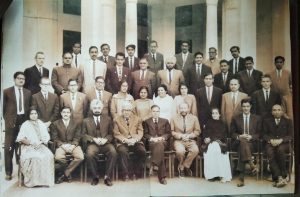
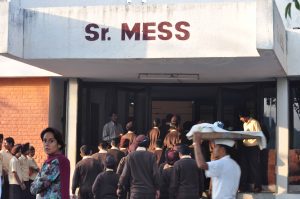
Photos of 1960s School staff and Senior School dining Hall. The two areas (food and Staff) where there was to be no compromise.
We are also trying to give the boys wholesome food, regardless of its cost. One of the methods employed to make both ends meet is to employ fewer menial servants than are generally to be found in similar institutions, and to make our boys do more and more useful work, even to the extent of managing an agricultural farm, running the boys’ shop, and doing the repairs and polishing of furniture. I hope our experiment will be successful, and as soon as number reaches 350, which is the maximum aimed at, we shall be self-supporting. Though our accounts have not been yet audited, we hope our deficit for the first year, when the school was run for only 120 boys, will not be more than Rs.2500/-. As our strength increases, we hope to wipe out this deficit. But to keep the school fully equipped with up-to-date equipment and to meet the expenditure of a non-recurring nature, we shall need funds; and for these we have to depend on the Union and State Governments and the generosity of the people. I am quite confident that if the attention, care and help which this institution has received in its infancy from the Government of Punjab and the public continues for few more years, the opinion expressed by the Inspection Committee of the Indian Public Schools Conference will soon materialize. Mr. K.I. Thomas, the Chairman of the I.P.S.C. and Mr. J.A.K. Martyn, Headmaster of the Doon School, who constituted the committee, observed:
“There seems every possibility of establishing at Nabha a school that will be second to none in India, and we were most impressed by the start that has already been made and would like to offer our congratulations to all concerned”.
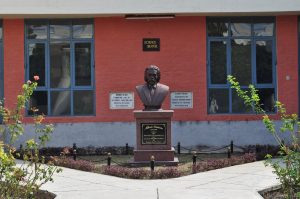
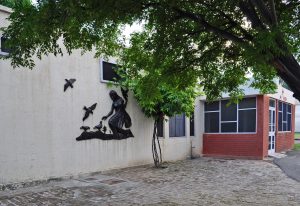
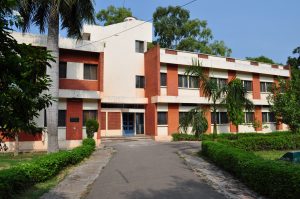
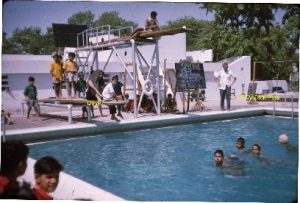
Many projects as shown in pictures were approved by the board in first year itself:Swimming Pool, Hostels, Labs Hospital and the Dining Hall above.
In academic matters, we lay great stress on teaching of mathematics and science subjects, as we feel that boys passing out of this school will have better openings in their future if they achieve a high proficiency in these subjects. We encourage boys to do practical work in the science subjects right from class VII, i.e. at the age of 11. The laboratories are so equipped that each boy will be able to do experiments independently.
In the way of games, we are planning to make all major games compulsory for the first five years only. During last two years of a boy’s career we will allow him to concentrate on whatever game or games he is keenly interested in, and in which he is likely to achieve a high degree of proficiency and so earn himself some credit in his post school days.
Society meetings, House shows, fine arts, crafts, music and many other co-curricular activities are being introduced on a large scale. I would request you all to visit the Exhibition in the Assembly Hall before you leave the premises this morning. This will give you some idea of what we are aiming at.
The School has been accepted as the associate member of the Indian Public Schools Conference, and as soon as our first batch takes the School Certificate Examination, we shall acquire full membership. The Ministry of Education, too, is sending a team of inspectors to inspect the school before it is put on the list of approved public schools. We strongly hope that the Government of India’s inspectors will be satisfied with us.
The School possesses another good feature. The Punjab Post War Services Reconstruction Fund has set aside forty lakh rupees for awarding scholarships to sons of serving and ex-service personnel of the Defence Services. From the interest on this amount, we shall be able to educate eighty boys at a time. The Government of Punjab, Jammu and Kashmir and Andhra Pradesh have also allotted scholarships to the School. This will mean that more than 25 per cent of the boys in the School will be such as have not the means of a public-school education but deserve admission on account of their suitability.
If a waiting list is any indication of the parents’ faith in a school, I must say that we have grounds for pardonable pride. Although our age of admission is 9 years, we already have names of pupils registered for admission in 1969, and the number on the waiting list for the next few years already exceeds the number of vacancies.
We originally planned to begin the School with eighty boys and to raise the strength to 200 by admitting twenty boys every year. But the demand for admission compelled us to start with 120 boys on the very first day, and now we are nearly 200, the number we were counting on having in six years’ time. The Board of Governors has, therefore, has rightly decided to raise the strength to 350, which means we shall need more boarding houses, staff bungalows and many other buildings such as a gymnasium, a swimming pool and a hospital and a dining hall. I am glad to inform the parents that the Board has approved the construction of all these, and we shall carry out the work in phases.
In the end, I would like to take this opportunity of expressing my gratitude to the Chairman and members of the Board, who always contrive to find time to solve the School’s problems in spite of being very busy with their multifarious duties and heavy responsibilities.
Last but not the least, I thank members of the staff who have worked in the School with a devotion and loyalty which have succeeded in winning the confidence of many parents who have already sent their children to the School and of many more who are anxious to do so.